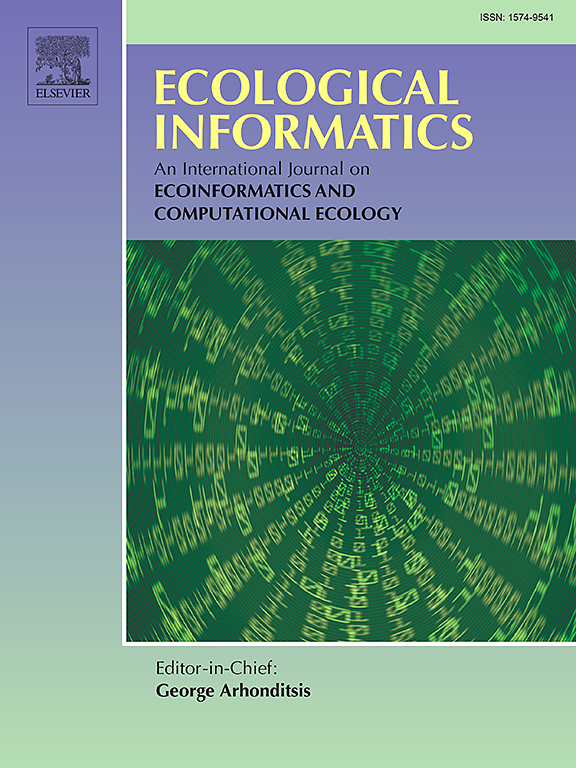LEAVES: An open-source web-based tool for the scalable annotation and visualisation of large-scale ecoacoustic datasets using cluster analysis
IF 5.8
2区 环境科学与生态学
Q1 ECOLOGY
引用次数: 0
Abstract
Ecoacoustics has emerged as a pivotal discipline in the conservation and monitoring of ecosystems, offering insights into species’ behaviour and ecosystem health through soundscape analysis. Central to this is the need for accurate annotations of environmental audio recordings, which underpin the computational models used in ecological monitoring. However, due to the increasingly large scale of datasets, annotation using existing tools and techniques cannot be performed at feasible speeds or with the necessary accuracy required for real-world application. The LEAVES (Large-scale Ecoacoustics Annotation and Visualisation with Efficient Segmentation) platform addresses this gap by leveraging unsupervised clustering techniques optimised for the high-throughput annotation of large-scale ecoacoustics datasets. Our evaluation across six real-world datasets shows that LEAVES improves annotation efficiency by up to 7.12 times compared to manual annotation while maintaining 79%–90% label similarity to validated data. We expect that our proposed tool will greatly accelerate the annotation process when generating high-quality labelled datasets, supporting larger-scale studies with broader community engagement in ecoacoustics research.
LEAVES:一个基于web的开源工具,用于使用聚类分析的大规模生态声学数据集的可扩展注释和可视化
生态声学已成为保护和监测生态系统的一门关键学科,它通过声景分析深入了解物种的行为和生态系统的健康状况。其核心是需要对环境音频记录进行准确注释,这也是生态监测所用计算模型的基础。然而,由于数据集的规模越来越大,使用现有的工具和技术无法以可行的速度进行注释,也无法达到实际应用所需的精确度。LEAVES(大规模生态声学注释和可视化高效分割)平台利用针对大规模生态声学数据集的高通量注释而优化的无监督聚类技术,填补了这一空白。我们对六个真实世界数据集的评估表明,与人工标注相比,LEAVES 的标注效率提高了 7.12 倍,同时与验证数据的标签相似度保持在 79%-90% 之间。我们预计,在生成高质量标签数据集时,我们提出的工具将大大加快注释过程,从而支持更大规模的研究和更广泛的生态声学研究社区参与。
本文章由计算机程序翻译,如有差异,请以英文原文为准。
求助全文
约1分钟内获得全文
求助全文
来源期刊

Ecological Informatics
环境科学-生态学
CiteScore
8.30
自引率
11.80%
发文量
346
审稿时长
46 days
期刊介绍:
The journal Ecological Informatics is devoted to the publication of high quality, peer-reviewed articles on all aspects of computational ecology, data science and biogeography. The scope of the journal takes into account the data-intensive nature of ecology, the growing capacity of information technology to access, harness and leverage complex data as well as the critical need for informing sustainable management in view of global environmental and climate change.
The nature of the journal is interdisciplinary at the crossover between ecology and informatics. It focuses on novel concepts and techniques for image- and genome-based monitoring and interpretation, sensor- and multimedia-based data acquisition, internet-based data archiving and sharing, data assimilation, modelling and prediction of ecological data.
 求助内容:
求助内容: 应助结果提醒方式:
应助结果提醒方式:


